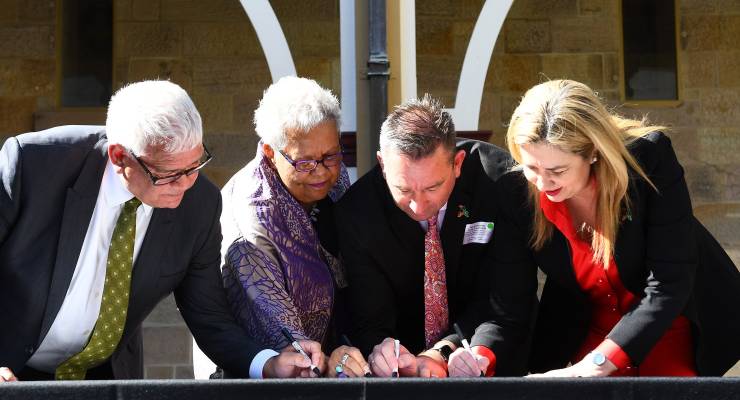
The Uluru Statement from the Heart called for Voice, Treaty and truth. On October 14, Australians said No to the Voice to Parliament, choosing not to enshrine an Aboriginal and Torres Strait Islander advisory body in the constitution. Many Indigenous peoples are devastated, seeing the result as a dismissal of their place and status on this continent.
But this is not the whole story. The national focus on the Voice referendum has obscured remarkable developments at the state and territory level. Every Australian jurisdiction except Western Australia has committed to talking treaty with First Nations peoples.
But what might the defeat of the referendum mean for Treaty?
What is a treaty?
Treaty has been a longstanding aspiration of Aboriginal and Torres Strait Islander peoples. However, the fact that no treaties were ever signed on this continent means many Australians have little knowledge about what a treaty is.
International law sets out a clear standard for what makes an agreement a treaty. A treaty must satisfy three conditions.
First, a treaty acknowledges Indigenous peoples are a distinct political community different from other Australians. Indigenous peoples are the only group in Australia who owned, occupied and governed the continent before colonisation. This recognition also acknowledges the historic and contemporary injustices that invasion has caused.
Second, a treaty is a political agreement reached by a fair process of negotiation between equals. Negotiation helps ensure the interests of everyone (both Indigenous and non-Indigenous) can be considered. But securing a fair negotiation process can be difficult in practice, given the unequal power imbalances that exist between Indigenous peoples and the settler state.
Third, treaties involve both sides — in this instance, Indigenous and non-Indigenous — committing to promises that bind the parties in an ongoing relationship of mutual obligation and shared responsibility. Given a treaty is built on the recognition of Indigenous peoples’ inherent sovereignty, a treaty will provide for some degree of culturally appropriate self-government. What this looks like in practice will be worked out in negotiations.
State and territory Treaty actions
State governments have agreed to begin treaty processes. Each has faced its own challenges and moved at different paces.
Victoria has made the most progress. In 2018, a representative body of Aboriginal Victorians was established. The First Peoples’ Assembly of Victoria has worked in partnership with the government to develop the institutions necessary to pursue Treaty negotiations. Together they have created the country’s first truth commission, an independent Treaty authority to oversee negotiations, a self-determination fund to support Aboriginal Victorians and a treaty negotiation framework. Early next year, the first formal treaty negotiations in this country are likely to begin.
Complications have emerged in the Northern Territory. The NT Treaty Commission delivered a final report in 2022, calling for a permanent, independent Treaty and truth commission. The government largely dismissed the report in December 2022. While the government said it would provide more details soon, Aboriginal Territorians are still waiting for an announcement on what comes next.
South Australia was one of the first jurisdictions to commit to Treaty in December 2016. However, the process was abandoned with a change of government in 2018. Since the election of the Malinauskas Labor government, Treaty is back on the agenda. Earlier this year, South Australia passed a law to create a Voice to the South Australian Parliament. It is expected a Treaty process will soon follow, though details are scarce.
Progress has proved slow in the ACT and Tasmania. The ACT government declared it was open to talking Treaty in 2018. But a difficult consultation process put Treaty on pause. Some First Nations peoples in the ACT have since adopted a different focus, seeking recognition of their native title.
In Tasmania, the government received the Pathway to Truth-Telling and Treaty report in 2021. Although the government accepted its recommendations, little progress has been made. An Aboriginal advisory group is consulting with communities about pathways forward for truth-telling and Treaty, but no timetable has been provided.
In other jurisdictions, the path is more complicated. NSW has yet to get started on a Treaty, but the referendum result has worried the government. In March, the incoming Labor government announced it would establish a three-person, independent Treaty commission to lead consultations with First Nations communities across the state. That process was to begin after the referendum. Reports suggest it is now being reviewed.
For several years, Queensland had made steady progress on Treaty. In May, the Path to Treaty Act was passed by the Queensland Parliament with bipartisan support. The act establishes a First Nation Treaty Institute and a truth-telling and healing inquiry.
After the referendum, however, the LNP opposition has stated it will abandon the process. The Labor government has confirmed it will push on. The 2024 state election may determine whether a Queensland Treaty process continues over the long term.
The federal government has committed to implementing the Uluru Statement from the Heart “in full”. Although focused on the Voice referendum, the government provided $5.8 million to the National Indigenous Australians Agency last year to consider the development and design of a national Treaty process.
The failed Voice referendum will likely lead the government to postpone it. It will not, however, eliminate the need for a national process for Treaty.
What happens next?
The failed referendum casts a long shadow over the state and territory Treaty processes. It is too simple, however, to suggest the result will necessarily lead to the collapse of Treaty talks. The impact will be felt differently across the country.
The scale of the defeat in Queensland, for example, where more than 68% of voters rejected the proposed amendment, has put the treaty process in real jeopardy.
In other states, however, the situation may be different. The process is yet to really begin in NSW and the slow and steady steps in Victoria have ensured a broad base of political support. This support did not evaporate on referendum night.
It is worth remembering some states and territories commenced their Treaty processes because, as former Victorian MP Gavin Jennings said, they were “not convinced that you can wait for a national process that has never ever delivered in relation to righting these wrongs”.
Many Australians will continue to support Treaty regardless of the referendum.
This article was originally published in The Conversation.









Linder and Hobbs support a treaty. Plus me makes three!
Here we go again…
Could be the way ahead via states, then the federal government is obliged to follow or at least acknowledge in spirit?
This strategy would replicate inversely that of the nativist US GOP in partnership with Koch Network think tanks & lobbyists, according to Nancy Maclean (Democracy in Chains: The Deep History of the Radical Right’s Stealth Plan for America) to stymie environmental regulation, fossil fuel/carbon constraints, ‘woke’ policies, taxes, anti-gerrymandering etc., using state legislatures where GOP has more sway vs. federally.